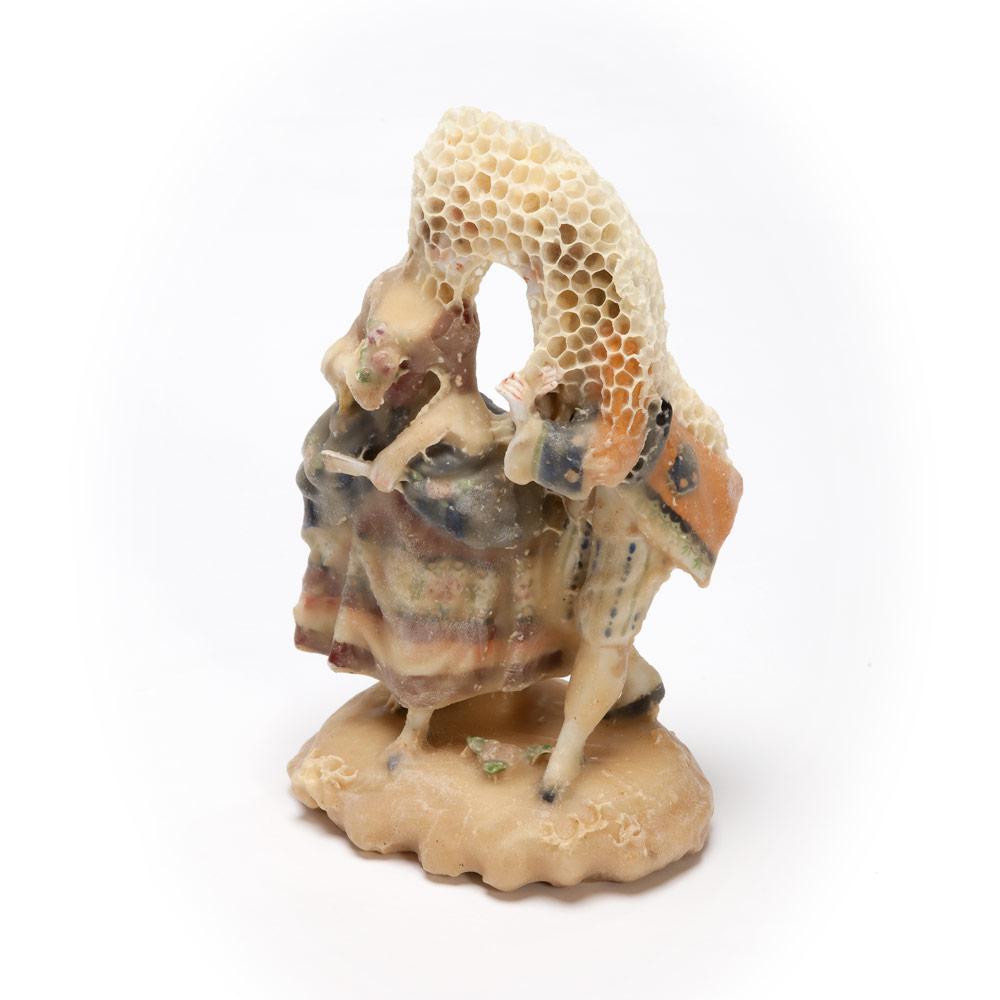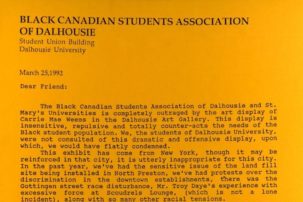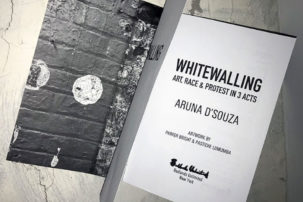This summer marks the end of an era at Oakville Galleries with the departure of its long-time Curator of Contemporary Art, Marnie Fleming. Since the early 1990s, Fleming (who officially retires on October 31) has redefined the model for a regional public art gallery with innovative exhibition programming and an adept collection strategy that, against the usual odds, has found a permanent home for key works by some of Canada’s best known contemporary artists. It’s a practice that has not only cemented Fleming’s reputation as a sharp and sensitive curatorial mind, but has also made Oakville Galleries a pivotal player on the Canadian art scene—no small achievement in the looming cultural shadow of its metropolitan neighbour just along the QEW.
Fleming casts a look back at more than 20 years of her work at the gallery in the permanent collection group show “You’ve Really Got a Hold on Me,” on view at Oakville Galleries’ Centennial Square and Gairloch Gardens exhibition spaces through this summer. Here, she offers Canadian Art’s Rosie Prata a few well-earned insights on institutional longevity, curatorial acumen and the delicate task of making an exhibition behave.
Rosie Prata: What guided you in making your selections from Oakville Galleries’ permanent collection?
Marnie Fleming: Over the years I have re-imagined the collection in numerous exhibitions that have generated new contexts and interpretations. For this show, however, I wanted to demonstrate the depth and range of Oakville Galleries’ acquisitions. It wasn’t an easy task as the gallery’s holdings have now grown to become an invaluable public resource. Of course, there is also the matter of organizing this show over our two vastly different exhibition spaces.
Some permanent collection works were acquired from exhibitions that were artistic responses to the nature of our two venues: Centennial Square and Gairloch Gardens. For example, some acknowledge the domestic nature of the former Gairloch estate, while others riff on books, language and knowledge in response to our other location within a public library. While I do have these two venues to play with, there are works that I absolutely love but couldn’t include due to scale or complexity.
I also wanted to listen to my intuition and to acknowledge certain artists whose practices have been instrumental in igniting my curatorial passions. I often joke that this exhibition is like a dinner party in which some guests will be provocative and tease, some will be inclusive and friendly, while still others are guaranteed to be loudspoken—even outrageous. I am hopeful they will all behave and get along for this final show before I retire!
RP: Do the pieces you have selected tell a story about the history of the galleries, or, more specifically, about your time spent there?
MF: There is a long history of Oakville Galleries that is comprised of those two previously independent sites. The galleries amalgamated in 1978 and I didn’t come on board until 1991 shortly after it was established as a contemporary art institution with policies firmly in place.
This exhibition focuses on work brought into the collection during my tenure; all of the pieces were acquired between 1991 and the present. While it is not my intention in “You’ve Really Got a Hold on Me” to posit a curatorial theme, nor demonstrate a chronological development of this period, several narratives nevertheless emerge—namely the story of the development of the collection along with the broader record of movements, practices and philosophies that have unfolded at Oakville Galleries in my twenty-plus years here.
The works in this show reveal important themes of the 1990s and early 2000s—notions of place; time and memory; the relationship between body and mind; the distinction between private and public spaces; and the implications of today’s digital world. Also the agendas of our own suburban community shaped this collection, particularly the inexorable process of sprawl, the destruction of the natural environment and the reliance on the automobile. Many works here suggest the intricacies of the suburban experience and draw attention to hidden, unofficial histories.
RP: Who are some of the artists in the show?
MF: Among the 30 artists included are: Kim Adams, Ian Carr-Harris, Janet Cardiff, Ken Lum, Angela Grauerholz, Liz Magor, Jeannie Thib, Tania Kitchell, Greg Curnoe and Ian Wallace. These artists represent just a fraction of Oakville Galleries’ collection, but offer a telling glimpse into our rich holdings.
RP: Is the show titled after the much-covered Smokey Robinson song “You’ve Really Got A Hold on Me”? If so, how do the lyrics relate to your feeling toward your time spent at the Galleries?
MF: I grew up in Windsor, Ontario, so Detroit’s Motown was never far from my heart—just like the artists in this show. Somehow Smokey’s refrain seems appropriate. I also feel like I have “grown up” with many of the artists over the years. In my first curated projects at Museum London (then called London Regional Art Gallery) I included the work of Stephen Andrews, Micah Lexier and David Merritt, all of whom are in “You’ve Really Got A Hold On Me.” We were all under 30 then, but we still support and learn from each other today.
I can say with certainty that all the works in this show—with all their ambiguities, mysteries and provocations—have really got a hold on me. It has always been my hope that viewers, likewise, will experience similar delights, and challenges. These are artworks that have moved me, challenged me and made me think in new and unexpected ways.
RP: What are your hopes for the future of Oakville Galleries after your retirement?
MF: Needless to say, securing a home for these works in Oakville over the years has brought me a great deal of pleasure. It is my hope that we will no longer be using the plural in our name, but rather have a singular purpose-built gallery in a downtown Oakville location in the near future. Within this new building, it is my wish that such a wonderful collection will have its own gallery space where viewers will always find some of their favourite works on view.









